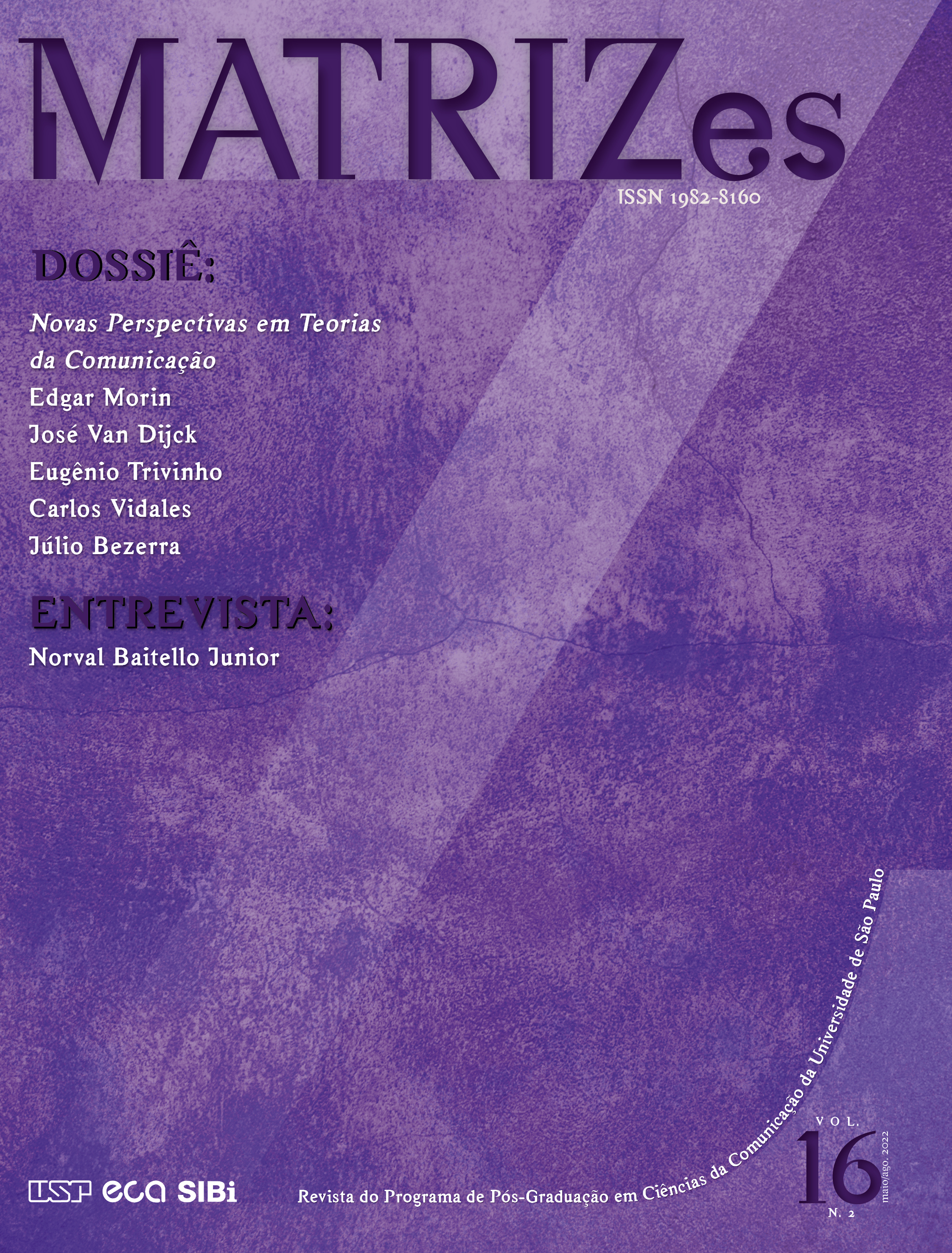What Is Glocal? Conceptual systematization and new theoretical considerations on the most crucial techno-cultural invention of the media civilization
DOI:
https://doi.org/10.11606/issn.1982-8160.v16i2p45-68Keywords:
Media civilization, Glocal phenomenon, Glocal conditionAbstract
The article presents the glocalization phenomenon’s fundamental characteristics, from its most remote technological origins until its current digital manifestations. According to the proposal, Glocal – neither global nor local, but a mixture of both – refers to processes and tendencies observed in the irreversible track of electronic communication in real-time. Concerning epistemological and empirical dimensions, the argumentation apprehends the glocal and glocalization’s socio-historical significance, focusing on its modus operandi, internal diversification, and multilateral consequences. New authorial considerations enrich the thesis of glocalization as a civilizational process and a mode of reproduction of capitalism.
Downloads
References
Agamben, G. (2005). O que é um dispositivo? Outra Travessia, (5), 9-16. https://bit.ly/35P8jdN
Agamben, G. (2006). Che cosè un dispositivo? Nottetempo.
Agamben, G. (2009). O que é o contemporâneo? E outros ensaios. Argos.
Bergson, H. (2006). Duração e simultaneidade. Martins Fontes.
Bourdieu, P. (1982). A economia das trocas simbólicas. Perspectiva.
Bourdieu, P. (1983). Pierre Bourdieu: Sociologia (R. Ortiz, Org.). Ática.
Bourdieu, P. (2002). O poder simbólico (pp. 59-73). Bertrand Brasil.
Bourdieu, P. (2005). Razões práticas: Sobre a teoria da ação (7a ed.). Papirus.
Breton, P. (s.d.). A utopia da comunicação. Instituto Piaget.
Breton, P., & Proulx, S. (1991). L’explosion de la communication : La naissance d’une nouvelle idéologie (Col. Sciences et Société). La Découverte; Boréal.
Deleuze, G. (1991). Foucault. Brasiliense.
Deleuze, G. (1996). O mistério de Ariana. Veja; Passagens.
Deleuze, G. (1999). Que és un dispositivo? In E. Balibar, H. Dreyfus, G. Deleuze, R. Machado, G. Lebrun, J.-A. Miller, F. Wahl, M. Frank, M. Morey, D. Hollier, W. Seitter, R. Bellour, F. Ewald, P. Macherey, B. Barret-Kriegel, M. Donnelly, A. Pizzorno, J. Rajchman, P. Hadot, C. Jambet, ... P. Veyne, Michel Foucault, filósofo (pp. 155-163). Gedisa.
Ferrara, L. A. (2007). Espaços comunicantes. Annablume.
Ferrara, L. A. (2008). Comunicação espaço cultura. Annablume.
Foucault, M. (1982). Microfísica do poder (3a ed.). Graal.
Foucault, M. (1987). Vigiar e punir. Vozes.
Foucault, M. (2004). A hermenêutica do sujeito. Martins Fontes.
Foucault, M. (2005). História da sexualidade I: A vontade de saber (16a ed.). Graal.
Foucault, M. (2008a). Segurança, território e população: Curso no Collège de France (1977-1978). Martins Fontes.
Foucault, M. (2008b). Nascimento da biopolítica: Curso no Collège de France (1978-1979). Martins Fontes.
Foucault, M. (2016). Subjetividade e verdade. Martins Fontes.
Kosik, K. (1976). Dialética do concreto (2a ed.). Paz e Terra.
Marx, K. (1983). O capital: Crítica da economia política (Col. Os economistas). Abril Cultural.
Marx, K. (2005). Manifesto comunista. Boitempo.
Robertson, R. (1994). Globalisation or glocalisation? Journal of International Communication, 1(1), 33-52. https://doi.org/10.1080/13216597.2012.709925
Robertson, R. (1995). Glocalization: Time-space and homogeneity-heterogeneity. In M. Featherstone, S. Lash, & R. Robertson (Eds.), Global modernities (pp. 25-44). Sage.
Robertson, R. (2002). Le dimensioni della cultura globale. In E. Batini & R. Ragionieri (Eds.), Culture e conflitti nella globalizzazione (pp. 17-30). Leo S. Olschki.
Robertson, R., & White, K. E. (2003). Globalization: An overview. In R. Robertson & K. E. White (Eds.), Globalization: Critical concepts in sociology (v. 1, pp. 1-44). Routledge.
Sartre, J.-P. (2015). O que é a subjetividade? Nova Fronteira.
Sedda, F. (Org.). (2004). Glocal: Sul presente a venire. Luca Sossella.
Trivinho, E. (2007). A dromocracia cibercultural: Lógica da vida humana na civilização mediática avançada (Col. Comunicação). Paulus.
Trivinho, E. (2012). Glocal: Visibilidade mediática, imaginário bunker e existência em tempo real. Annablume.
Trivinho, E. (2014). A condição glocal: Reconfigurações tecnoculturais, sociopolíticas e econômico-financeiras na civilização mediática avançada. Annablume; Fapesp.
Virilio, P. (1984). L’horizon négatif: Essai de dromoscopie. Galilée.
Virilio, P. (1993a). O espaço crítico. Ed. 34.
Virilio, P. (1993b). A inércia polar. Dom Quixote.
Virilio, P. (1995). La vitesse de libération. Galilée.
Wiener, N. (1948). Cybernetics. MIT Press.
Wiener, N. (1996). Cibernética e sociedade: O uso humano de seres humanos (15a ed.). Cultrix.
Žižek, S. (2003). Bem-vindo ao deserto do real. Boitempo.
Downloads
Published
Issue
Section
License
Copyright (c) 2022 Eugênio Rondini Trivinho

This work is licensed under a Creative Commons Attribution-NonCommercial-ShareAlike 4.0 International License.
Authors who publish in this journal agree to the following terms:
- Authors retain the copyright and grant the journal the right to first publication, with the work simultaneously licensed under the Creative Commons Attribution License (CC BY-NC-SA 4.0) which allows sharing of the work with acknowledgment of authorship and initial publication in this journal for non-commercial purposes.
- Authors are authorized to assume additional contracts separately, for non-exclusive distribution of the version of the work published in this journal (eg, publishing in institutional repository or as a book chapter), with acknowledgment of authorship and initial publication in this journal.






















